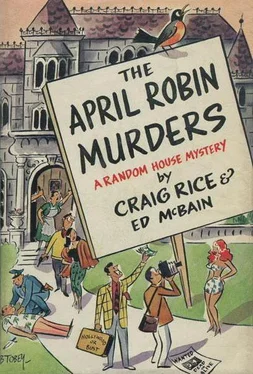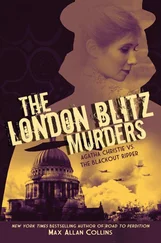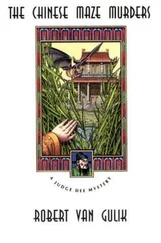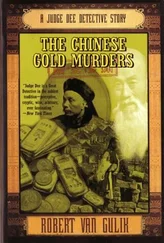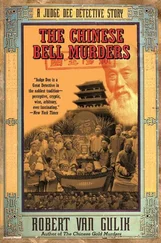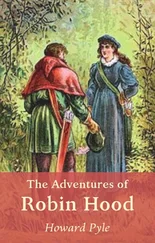“You separate an egg white from the rest of the egg, dump it in the mixer with the other ingredients, and whammo! Foam!”
“Thank you,” Handsome said.
“Do you think he’ll come?” Bingo asked.
“Not if Mrs. DeLee phoned him,” Handsome said. “She’s a nice old lady but I wouldn’t put it past her. Especially if something funny happened back in Kimballsville in 1928.”
“I think something very funny happened, Handsome.”
“I think so, too, Bingo.”
“It still doesn’t explain, though—” Bingo started, and then clamped his mouth shut. “The window!” he said, and he was off his stool immediately, bolting for the door. Behind him, Handsome said, “Browne?”
“Yes, but he’s seen us,” Bingo said, and he threw open the door.
They heard his footsteps instantly. The Owl’s Roost boasted a blacktop parking lot, and Browne’s shoes clattered noisily on the asphalt surface now as he raced across the deserted space toward his car. It was beautiful, Bingo mused, to see Handsome in motion, his long legs chewing up the asphalt, his wide shoulders pushing against the California night. It was beautiful to watch him catch Charlie Browne by the shoulder just as he opened the door to the car, beautiful to watch him spin the con man around, release the shoulder, and recapture the man by the lapels of his suit.
“What is this?” Browne shouted.
“Hello, Mr. Budlong,” Handsome said. “Haven’t seen you in a long time.”
“Budlong? What the hell are you talking about?” Browne said. “My name’s Carlyle Buchanan.”
“And also Courtney Budlong, and Clifford Bradbury, and Charlie Browne.”
“I never saw either of you before in my entire life,” Browne said, but without much conviction.
Bingo cocked his head to one side and looked at Browne with paternal exasperation. Handsome clucked his tongue. Browne sighed heavily.
“Okay,” he said.
“There now, that’s better,” Bingo said.
“Since you were about to enter your car anyway,” Handsome said, “why don’t we all go inside and have a chat?”
“I have nothing to talk about,” Browne said. “I sold you that house legally.”
“Let’s sit, anyway,” Bingo said.
They went into the car, Browne sitting on the front seat between Bingo and Handsome. “If you sold us the April Robin house legally,” Bingo said, “that means the Julien Lattimer signature is bona fide. Where’d you get it?”
Charlie Browne did not answer.
“He’s very much like Mrs. DeLee,” Handsome said. “She didn’t have much to say, either.” He paused. “At first.”
“Did you talk to Mari—?” Browne started, and then stopped himself. The mild California night air pushed its way through the window on the driver’s side, worked its way across the serious faces of the three men on the front seat, and then moved past Handsome and through the window on his side, bound for Japan.
“She told us all about how Lois DeLee died,” Handsome said.
And then Bingo, thinking bigger than he’d ever thought since he’d come to Hollywood, said, “All about the car accident.”
To say that Charlie Browne’s mouth fell open would have been complete understatement, Bingo thought. Not only did it fall open, but it appeared ready to drop from his face. At any moment, Bingo expected Browne’s jawbone to fall free and topple down the front of Browne’s sports shirt.
“Yes,” Bingo said, in simple reiteration. “The car accident.”
Browne closed his mouth, and then he closed his eyes, and Bingo imagined he was listening to the music of a heavenly choir as the Judgment Day rolls were read. He nodded then and said, “It wasn’t my idea. It was April Robin’s.”
“Maybe we ought to listen to his side of the story,” Handsome suggested.
“Sure,” Bingo said. “Certainly. His side of the story begins like this. First, you were not married to Lois DeLee, isn’t that right? You only used that gimmick as an extra sort of pressure.”
“Yes,” Browne admitted.
“Second, you were staying at the cabins with Mariposa DeLee on the night Lois died. You’d probably never met Lois before that night.”
“I’d seen her before,” Browne said. “She’d come to stay with Mariposa about two weeks before the accident. I’d seen her around.”
“Now let’s have your version of the accident.”
“We were sitting outside, Mariposa and me,” Browne said. His brow wrinkled but not with the effort of recall. Bingo was more than certain that the events of that December night in 1928 were indelibly stamped into the memory of Charlie Browne and would never be removed. “Lois had gone for a walk. She was just a teen-age kid, you know, fifteen, but well developed for a kid. But she went for walks a lot, a dreamy kind of kid. She was crossing the highway when this Stutz Bearcat came tooling down the road. It was going, man! Not like today’s high-powered cars, but this baby had power of its own, and it hugged the road, and it came roaring out of the darkness like the Twentieth Century Limited. It must have knocked Lois ten feet in the air and then sent her sprawling another thirty feet onto the highway. Mariposa and I came running out of the motel. The car stopped. I don’t know why, but the driver pulled up and got out. I recognized her right away. There wasn’t a person in America, no less California, who didn’t know that face. It was April Robin.”
“Go on,” Bingo said tensely. He could, through Browne’s voice and words, visualize the fragile seventeen-year-old stepping from the long, low-slung roadster, fresh from the laughter that had greeted her voice at the Pantages, perhaps trembling a little, her hair bobbed, her dress short and straight-lined in the style of the twenties, a long strand of pearls around her throat perhaps, dropping to the middle of the waistless garment.
“Lois was dead,” Browne said, and Bingo heard the words as if he were young April Robin, and he could feel the sudden knowledge of the highway death, and he almost began shivering as April Robin must have done that night some thirty years ago. “I told this to Miss Robin. I told her she was in serious trouble. I—”
“You told her Lois was your wife,” Handsome interrupted.
“Yes. Because... well, I’d already made a plan. The minute I saw who was driving that car, I began thinking in dollar signs. And I knew my case would be stronger if she thought I was Lois’ husband. I told her we would keep it quiet... if she paid us. I asked her how much she had in the bank. She wasn’t sure. Most of her money was in trust funds she couldn’t touch. She said it was something above fifty thousand. I told her I wanted all of it. We took Lois off the highway and left the car at the motel that night. I called a friend of mine, a doctor in San Diego, and he came up and was willing to say the kid had died of pneumonia... for a slice of the dough. The next morning Miss Robin went to her bank in Hollywood to get the money.”
“And she came back with it,” Bingo said.
“Yes. And she also came back with the reviews of her picture which had opened the night before. And she also came back with an idea.”
“What was the idea?”
“She wanted to get away from Hollywood. After what they’d done to her the night before, she wanted to get away, never see them again, never hear of them again, never give them a chance to laugh at April Robin as long as she lived. Her idea was a simple one. She wanted to change places with Lois DeLee. She wanted April Robin to die.”
“But she thought Lois was your wife, didn’t she? Wouldn’t she imagine there were complications to—”
“As far as she was concerned, Lois Browne was dead, my wife was dead. She wanted to assume the name of Lois DeLee, as if the marriage had never existed. This was fine with me because, actually, there’d never been a damn marriage. She still doesn’t know what the tombstone in Kimballsville says. She probably thinks it’s inscribed ‘Lois Browne.’ But the doctor and I couldn’t take any chances. We had to put her real name on the stone.”
Читать дальше
